WEYERHAEUSER ENVIRONMENTAL BOOKS
Paul S. Sutter, Editor
WEYERHAEUSER ENVIRONMENTAL BOOKS explore human relationships with natural environments in all their variety and complexity. They seek to cast new light on the ways that natural systems affect human communities, the ways that people affect the environments of which they are a part, and the ways that different cultural conceptions of nature profoundly shape our sense of the world around us. A complete list of the books in the series appears at the end of this book.
CHARGED
A History of Batteries and Lessons for a Clean Energy Future
JAMES MORTON TURNER
Foreword By Paul S. Sutter
UNIVERSITY OF WASHINGTON PRESS
Seattle
Charged: A History of Batteries and Lessons for a Clean Energy Future is published with the assistance of a grant from the Weyerhaeuser Environmental Books Endowment, established by the Weyerhaeuser Company Foundation, members of the Weyerhaeuser family, and Janet and Jack Creighton.
Copyright 2022 by the University of Washington Press
Composed in Minion Pro, typeface designed by Robert Slimbach
26 25 24 23 225 4 3 2 1
Printed and bound in the United States of America
All rights reserved. No part of this publication may be reproduced or transmitted in any form or by any means, electronic or mechanical, including photocopy, recording, or any information storage or retrieval system, without permission in writing from the publisher.
UNIVERSITY OF WASHINGTON PRESS
uwapress.uw.edu
LIBRARY OF CONGRESS CATALOGING-IN-PUBLICATION DATA
Names: Turner, James Morton, 1973 author.
Title: Charged : a history of batteries and lessons for a clean energy future / James Morton Turner.
Description: Seattle : University of Washington Press, [2022] | Series: Weyerhaeuser environmental books | Includes bibliographical references and index. | Identifiers: LCCN 2021037424 (print) | LCCN 2021037425 (ebook) | ISBN 9780295750248 (hardcover) | ISBN 9780295750262 (ebook)
Subjects: LCSH Electric batteries.
Classification: LCC TK2896 .T87 2022 (print) | LCC TK2896 (ebook) |DDC 621.31/242 dc23/eng/20211110
LC record available at https://lccn.loc.gov/2021037424
LC ebook record available at https://lccn.loc.gov/2021037425
 This paper meets the requirements of ANSI/NISO Z39.48-1992 (Permanence of Paper).
This paper meets the requirements of ANSI/NISO Z39.48-1992 (Permanence of Paper).
For Cole, Liam, and August
CONTENTS
FOREWORD
Whats the Matter with Batteries?
PAUL S. SUTTER
When I was in graduate school in the early 1990s, there was a crystalline piece of graffiti stenciled on the sidewalk in front of the campus library. It read, simply, Ecology tip: consume less. This subversively friendly counsel paired the banal genre of eco-advice with a radical message: people (and particularly wealthy people) used far too many resources, and our consumer habits were driving ecological destruction. There was nothing novel about that advice; the call to reduce the ecological footprint of the developed world had anchored global environmental politics for a couple of decades by that point. But I appreciated the economy of the message, and it became my environmental mantra. What I appreciated less well, at first, was the sardonic quality of the message, the mocking sense that its easy guidance was going to be exceptionally difficult to execute. The solution to global ecological destruction, it intimated, would not involve the stuff of tips: a lifestyle tweak or faithful adherence to green consumerism. Consuming less was going to hurt, both as an individual practice and as a structural fix. Over the last quarter century, as we have waded deeper into a planetary crisis, this apparent solution to our environmental problemconsuming lesshas remained as clear as our incapacity to achieve it. The brilliance of this small piece of public art, I came to realize, was as much in its diagnosis of the wicked problem we face as in its purported solution.
More than anything I have read, James Morton Turners compelling new book, Charged: A History of Batteries and Lessons for a Clean Energy Future, has shaken my environmentalist faith that consuming less is a feasible path forward, particularly when it comes to countering climate change. The world we live in requires energy, and while we should certainly pursue conservation and other efficiencies, we cannot assume that decarbonization will be achieved through reduced energy consumption. Instead, the urgency of the climate crisis demands that we rapidly pivot to a clean energy economy to meet our present and future energy needs. Turner is an advocate for this transition, but his vital caution is that our clean energy future will have dramatic material consequences. It will require new technologies and infrastructures: electric vehicles by the hundreds of millions, vast solar arrays and fields of wind turbines, a new grid to deliver this sustainable energy, and, critically, the scaling up of the production of batteries to store this energy and mobilize its power. This rapid transition is possible, but it will involve the consumption of natural resources on a massive scale, and it will have consequences for human justice as well as environmental sustainability.
To assess the material consequences of our aspirational clean energy future, Turner focuses his analysis on the history of the batteries that powered the twentieth century. Batteries are such a mundane technology whether they be the lead-acid batteries in conventional automobiles, the AA batteries in flashlights, or the lithium-ion batteries in smartphonesthat we tend not to think about them. They are, he points out, a persistent black box that we take for granted without understanding their inner workings. One of the great virtues of Charged is the education you will receive in how batteries work and how they have evolved over time. Battery literacy, or what Turner more broadly calls industrial ecological literacy, is so important to him that at several points he recounts building his own rudimentary batteries or, in other cases, taking batteries apart. These exercises show the reader what batteries are and how they work, but they are also metaphors for what Turner is trying to accomplish more broadly: to open up the black box and consider how the sourcing and production of batteries connect us to many other communities and landscapes.
Several lessons flow from cracking batteries open to get a better look. While batteries themselves are not primary sources of energy, they have been critical to storing and mobilizing energy produced by other sources, and they will be critical to our use of wind, solar, hydro, and other renewable energy sources, none of which are as portable or reliable as fossil fuels. As purveyors of energy, Turner tells us, batteries are inefficient, but we value them for the quality of energy that they deliver. Batteries provide energy that is cordless, reliable, and portable; they are the unsung heroes of what Turner calls our culture of mobility. To maintain this modern culture of convenience while weaning ourselves from fossil fuels, we are going to need a lot of batteries.
A second lesson is that batteries are materials-intensive technologies with their own suite of environmental costs. But because we pay so little attention to batteries, and particularly where they come from, this can be hard to see. Depending on what type of batteries we are talking about, they might require (or have required in the past) lead, sulfuric acid, mercury, manganese, zinc, steel, carbon, graphite, ammonium chloride, potassium hydroxide, cadmium, lithium, nickel, or cobalt. Batteries are of the earth; they are the stuff of mines and metallurgy and energy-intensive materials processing, and when their useful lives come to an end, they must either be recycled or returned to the earth. Thus, while batteries will be critical to liberating us from our fossil fuel dependence, we will be trading one set of materials dependencies for another as we rapidly scale up their production. Leaving fossil fuels in the ground, in other words, is going to involve pulling a lot of other resources out of it.

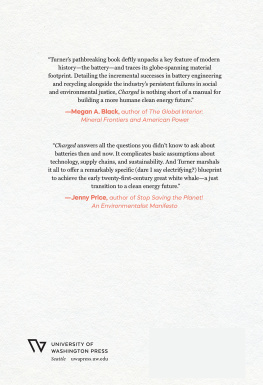
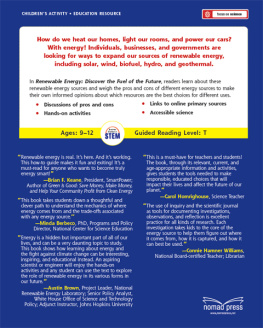

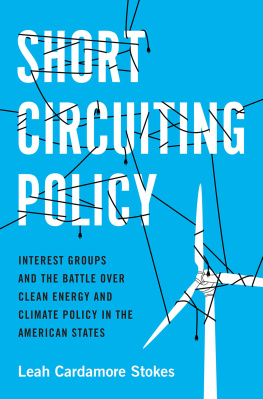
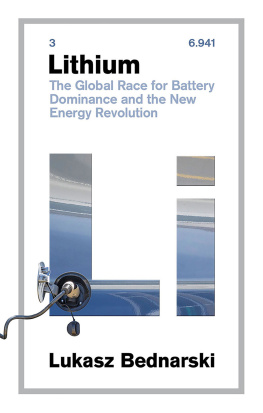
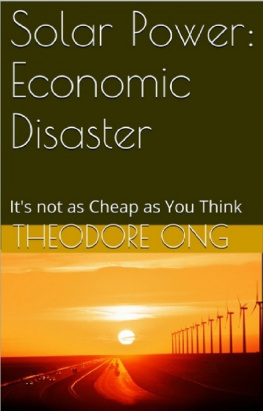
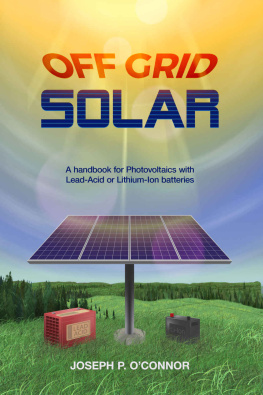


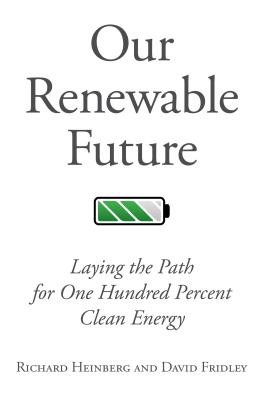

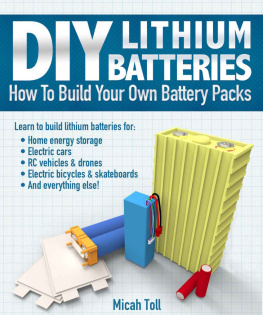
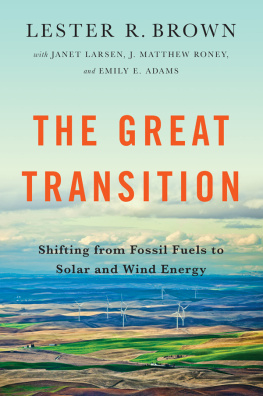

 This paper meets the requirements of ANSI/NISO Z39.48-1992 (Permanence of Paper).
This paper meets the requirements of ANSI/NISO Z39.48-1992 (Permanence of Paper).